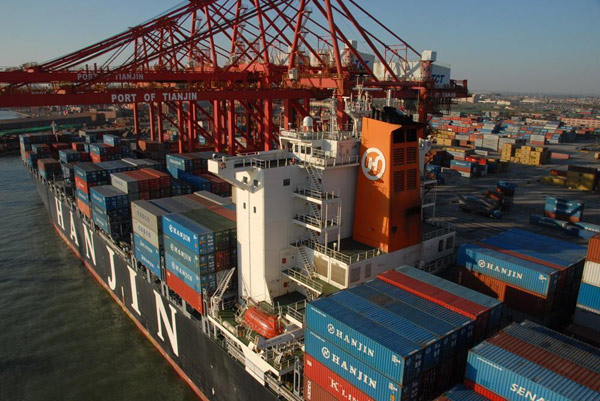Stepping stones to freely traded renminbi
Updated: 2015-03-16 09:20
By Carmen Ling(China Daily)
|
|||||||||||
 |
|
Containers loaded on a vessel at Tianjin port. China is expected to launch three new free trade zones in near term, including Tianjin in northern China, Fujian in the southeast and Guangdong in the south. [Photo provided to China Daily] |
Just a year and a half after opening its first free trade zone in Shanghai, China is now liberalizing its offshore borrowing for firms registered there. The China (Shanghai) Pilot Free Trade Zone was originally billed as a three-year trial, but China is forging ahead, and will expand Shanghai and launch three new zones in Tianjin in northern China, Fujian in the southeast and Guangdong in the south in the near future.
While not the sole conduit for reform in China, the trade zone plan is crucial to the prospects of a fully convertible renminbi, and the speed at which China is rolling out the plan is surprising many observers.
The announcement on Feb 12 that offshore borrowing for firms in the Shanghai free trade zone will be relaxed further - and that the new regulation will include banks - is a significant breakthrough and suggests China is committed to achieving full convertibility of the renminbi.
Launched in September 2013, the Shanghai free trade zone has been an important test bed in China for freer trade, and a more liberal business and financial environment. The fact that China is now expanding the zone and replicating it in other cities confirms that the government considers it a success.
The zone is bringing real benefits to China's economy and companies. According to official data, the export-import trade passing through the four areas of the free trade zone between January and August rose 11 percent compared to the same period of 2013, before the zone was established. Logistics and inventory costs are down by an average of 10 percent and the average time required to clear customs has been reduced by three to four days.
The zone is also contributing to China's financial reform. Initiatives such as interest-rate liberalization and the cross-border renminbi sweeping program - which allows companies to repatriate their trapped cash onshore to offshore through a linked cash pool, are crucial to promoting internationalization of the renminbi. Between January and August last year, two-way renminbi flows arising from cross-border sweeping reached more than 27.2 billion.
The risks associated with the zone are proving manageable. A negative list was put in place to restrict foreign funds from investing in specific industries within the zone, such as sensitive or overheated sectors. This list has since been shortened, demonstrating the Chinese government's growing level of confidence in the zone. Also, commercial banks are enforcing know-your-customer procedures to ensure that the funds moving in and out of China are supporting genuine trade.
Bearing in mind this track record in Shanghai, launching new free trade zones seems a sensible step given China's sheer size.
The Guangdong free trade zone, including Qianhai, will mainly serve companies in the high-end financial services industry located in Hong Kong, the Pearl River Delta and Macao. The Tianjin zone targets those located in the northern area, where some 80 Fortune 500 companies have established their presence, including many international multinational firms. Meanwhile, the Fujian zone will leverage its strength in trade with Taiwan, and in overseas logistics.
While the details have yet to be ironed out, the three new zones are expected to implement similar policies to Shanghai.
The Shanghai zone is likely to remain a testing ground for new initiatives, such as renminbi-denominated commodity contracts, starting with crude oil futures which were approved last December. These contracts can be traded by both domestic and international investors, and should support the partial redenomination of commodity pricing quotation into renminbi.
Companies that have embraced China's liberalization via the Shanghai zone are benefitting from first-mover advantage, but the free trade zones are not without challenges. Many multinational companies feel uncomfortable with the piecemeal and unpredictable way in which China announces its policy changes. Some are reluctant to set up an entity in a free trade zone, only to find another new, more user-friendly policy around the corner.
In addition, renminbi appreciation is no longer seen as a one-way bet, posing an even bigger challenge for companies as they will have to start hedging their exposure to it.
Expansion of China's free trade zones is likely to take time. Their scale will be small compared to the broader economy and it is unlikely that the zones will have a huge impact on activities beyond their boundaries.
What is clear, though, is China is committed to driving financial reform in a bid to reach the end-game of full convertibility in the renminbi, and the new free trade zones will act as stepping stones along the way.
The author is head of Renminbi Solutions, Standard Chartered. The views do not necessarily reflect those of China Daily.
Related Stories
Fujian FTZ to focus on cross-Straits trade with Taiwan 2015-03-13 08:52
Tianjin FTZ aims for long-term development role 2015-03-13 08:52
New Guangdong FTZ set to boost investment 2015-03-13 08:52
Chinese currency trade settlement gains popularity in Gulf region 2015-03-13 11:38
China's international payment system ready 2015-03-10 09:55
Today's Top News
UK seeks to join China-proposed bank
China has 'huge growth potential'
72% worry about retirement life
Fears voiced over violent scenes
China likely to ease again if inflation falls: insider
Reproach for wrongful convictions
China's two universities make top 50
Astronauts return from space station
Hot Topics
Lunar probe , China growth forecasts, Emission rules get tougher, China seen through 'colored lens', International board,
Editor's Picks

|

|

|

|

|

|





